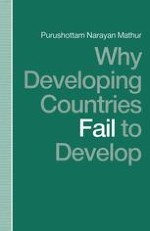1991 | OriginalPaper | Chapter
The Economics of Technology Transfer
Author : Purushottam Narayan Mathur
Published in: Why Developing Countries Fail to Develop
Publisher: Palgrave Macmillan UK
Included in: Professional Book Archive
Activate our intelligent search to find suitable subject content or patents.
Select sections of text to find matching patents with Artificial Intelligence. powered by
Select sections of text to find additional relevant content using AI-assisted search. powered by
We have seen that to initiate development technological transfer is a must. The success or failure of the development effort depends on the terms and the modalities of the technical transfer itself. On that depends whether the country can transform itself into a fully fledged developed country, or become an appendage to the developed world or, in the terminology of Gunnar Myrdal, participate only in the ‘backwash effect’ of the growth of the industrialised world — that is, to suffer a drain on its resources as the developed countries become richer and richer. We have seen that before the Second World War, quite a few countries had graduated into the membership of the exclusive club of the developed countries, now formalised as the OECD. However, after the Second World War the international economic order became so organised that not a single country entered the elect group. During the 1970s, high hopes of achieving this transition were entertained for some countries, but with the collapse of international commodity prices in the 1980s and the surfacing of the ‘Third World Debt’ problem, all those hopes shattered. Below, we shall look into the theoretical possibility of achieving technological transfer in a present-day world bereft of economic colonies and empires. We shall also see some of the pitfalls that may occur during the process.
